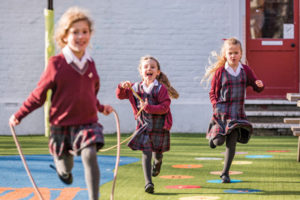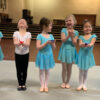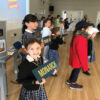by Steven Jeffery
Headteacher of Our Lady of Sion
Steven Jeffery is Headteacher of Our Lady of Sion, an inter-denominational school for boys and girls, ages 3 to 18, in Worthing. Having been Deputy Head at the school for six years and Acting Head for six months, Steven was recently appointed Headteacher. A passionate musician, Steven is well known in Worthing having lived and taught there for many years, and is actively involved in community support. His education philosophy focuses in on the individual character and potential of each child. Where there is a positive connection between teacher and young person, the outcomes can be impressive and groundbreaking. Understanding the child is essential in achieving that all-important connection.
Over the last 25 years in education, I have enjoyed and endured various ‘wheels of progress’ brought in by educationalists and politicians to support and serve the academic endeavours of young people. Some of these ideas have been energising and immensely valuable, whereas others have seemingly distracted teachers and pupils from what truly matters. Of course, there are always those ‘wheels of progress’ that are unknowingly reinvented by well-meaning experts who re-trial historical methods under new facades. This is a familiar feature of our education system. It often goes astray in the maze of political initiatives, and unfortunately the essence of inspirational, engaging and genuinely satisfying learning can be somewhat lost.
 One thing that remains steadfast and true is the importance of a positive and respectful teacher-pupil rapport. I strongly believe that the role of teacher is undoubtedly vocational and the ways in which an educator works is fundamental to the academic success and emotional wellbeing of each child. Since as long as I can remember, I have always been moved by the notion of paths crossing. I have met thousands of young people over the years and always count those moments as a deeply significant and profound part of this role. Our paths have crossed, so what can I now bring to this child? How can I unlock creativity? What will inspire this young person to achieve great outcomes? Who is this child? Those tacet questions signify the beginning of one of the most noteworthy relationships that a child will ever have. We all remember our teachers. We remember many of the conversations we had with them and how these made us feel and respond. We easily recall those that took time to get to know us and encourage us. We regrettably also very easily recollect those that saw us as mere numbers, and never as people, treating us in apparent accordance with that very mindset.
One thing that remains steadfast and true is the importance of a positive and respectful teacher-pupil rapport. I strongly believe that the role of teacher is undoubtedly vocational and the ways in which an educator works is fundamental to the academic success and emotional wellbeing of each child. Since as long as I can remember, I have always been moved by the notion of paths crossing. I have met thousands of young people over the years and always count those moments as a deeply significant and profound part of this role. Our paths have crossed, so what can I now bring to this child? How can I unlock creativity? What will inspire this young person to achieve great outcomes? Who is this child? Those tacet questions signify the beginning of one of the most noteworthy relationships that a child will ever have. We all remember our teachers. We remember many of the conversations we had with them and how these made us feel and respond. We easily recall those that took time to get to know us and encourage us. We regrettably also very easily recollect those that saw us as mere numbers, and never as people, treating us in apparent accordance with that very mindset.
At the start of my career, I vowed that every child with whom I worked would be known as an individual and not a number. So, what does that mean in real terms? How does it look in the daily life of a mindful teacher?
Learn names quickly. Knowing a child’s name makes all the difference. What does it say to a child when we know his/her name? Ask yourself: who is the one teacher in your entire life who made the biggest difference for you – who taught you so well that you still think about him or her as your best teacher? I bet that for almost all of us, that best teacher was someone who knew you by name. It takes effort but it’s worth it. I have always applied mental images to each new child I meet. Every Luke is given a lightsabre, Tom always carries a cat, Caspar wears a white sheet (friendly ghost style), Jenna is always engaged in a game of giant Jenga, and Hannah always carries a spanner, and so on. It still amazes me that once I have applied these mental images, they stick. When I see Jenna walking along the corridor, the giant
Jenga is right there with her!
Education is about learning more about the unknown so that more of the unknown becomes known. That is why learning is life-long, energising and exciting. Getting to know an individual is to understand the child’s perspective, interests, environment, beliefs, and passions – essentially what makes the child tick. As Headteacher and teacher, I want to engage with each young person in ways that demonstrate my knowledge of that person as a whole being, not merely a student or pupil. I want those encounters to affirm the child’s qualities and impressive talents. I want to share how impressed I am to hear about their community outreach, their kindness to others, their achievements in music or sport, their outstanding contribution to a local charity and their personal triumphs in the classroom. This knowledge comes from regular interactions, asking tutors to pass on the good news, and encouraging parents to communicate successes. A school’s reward system should offer parents and grandparents the opportunity to nominate their children/grandchildren for awards linked to acts of kindness and achievements beyond the classroom. ‘Shout Out!’ assemblies offer teachers and students the opportunity to nominate people for a special mention for their outstanding actions or accomplishments. Success is broader than academic prowess, although schools should be giving this area considerable focus too.
Remember birthdays. This is a simple way to reiterate how much we value each child. Sending out birthday messages each day, being inclusive of those that fall on weekends and holidays. Celebrating in this way is to rejoice in the delight of community and tangibly express how much each member is valued and known.
A school community works together towards common goals. Examples of these ambitions could be learning about ourselves and each other, understanding diversity and discovering its beauty, finding our own voices and using these for change, recognising the part we all play in building a better society and so on. Within each of these communal aims, there is an individual response brought to the whole. When a culture actively promotes the importance and power of action, the school can make a noteworthy impact on the immediate community and even the world. Being open to recognise and notice an individual’s acts of kindness, timely words of wisdom, selfless actions and heartfelt responses to world-issues, will unquestionably empower a young person to utilise their time and talents for philanthropic causes. Recognising our own positive impact on the world around us provides us with a sense of purpose and significance. When we are reminded that the part we play matters, our energy soars and so does our fundamental wellbeing. I believe that members of the school community should actively notice altruistic acts and encourage those individuals to keep on going.
An understanding of the individual journey towards personal success is a crucial factor in developing a ‘known not number’ culture. I feel very strongly that parents and educators should repeatedly encourage students to guard against making comparisons with others. Attention should be given to effort, and the celebration of this should always be the priority rather than the actual grade. It is therefore crucial that a teacher knows a student well and knows what outstanding effort looks like for that child. It is very easy to lavishly praise the Grade 9 student and fail to celebrate the Grade 4 student, even though the Grade 4 student demonstrated more progress, dedication and commitment than the seemingly more successful child. Both students are worthy of congratulations, but if the Grade 9 student was achieving the Grade 4 outcome, the response would need to be appropriately tailored too. When we know our students, we can motivate, engage, encourage, inspire, challenge and change them through carefully chosen words, considered tone and mindful body language as well as a steadfast commitment to helping every child achieve full potential. It is the individual’s possibilities that we should be heedful of, not merely grades. Each child sees the world in their own unique way. Taking time to understand this will make all the difference as to how we communicate.
I count myself very honoured to work with young people. I want to encourage each one of them to be the very best that they can be. If I am getting to know who they are, how they respond and think, I will be doing my best for them. May they always know that they are welcome, known and admired and never a number. We are working with unique, fragile souls. That work brings with it a momentous responsibility. Each encounter matters. Each word is heard. What will my impact be?
Our Lady of Sion is an independent inter-denominational school based in Worthing for girls and boys, ages 3 to 18.
www.sionschool.org.uk










